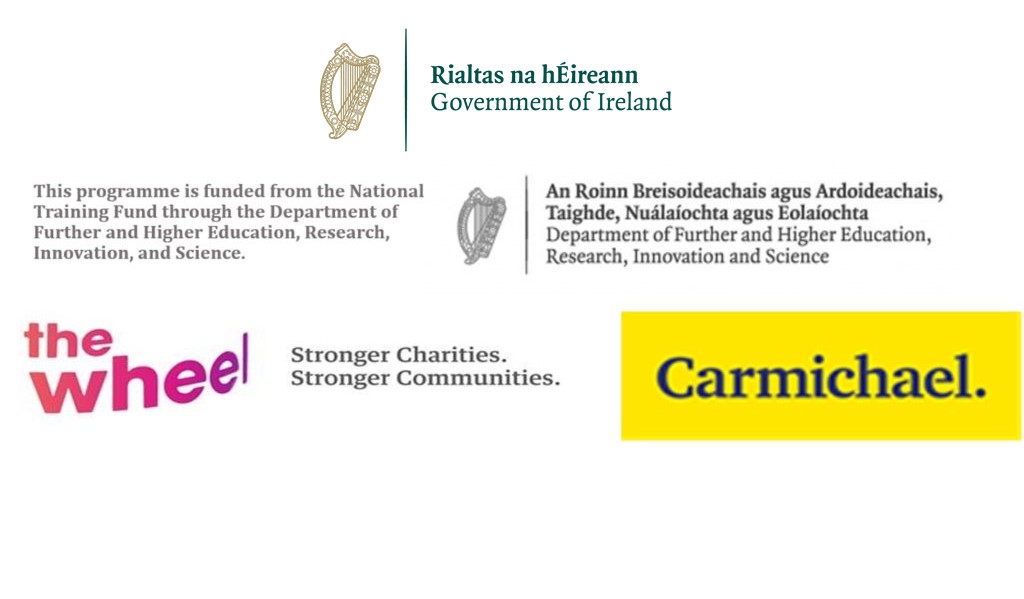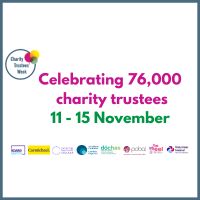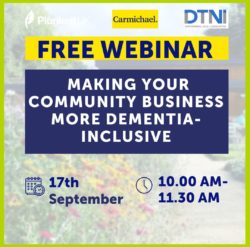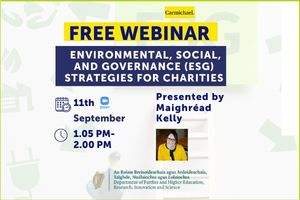Effective Leadership & Management of Teams
All too often volunteer leaders/trustees and employees in the non-profit sector can find themselves in management and leadership roles without having a full understanding of what such roles actually involve. Furthermore, it is frequently the case that no further training or support is offered to people in these demanding positions.
The recently published OECD Skills Strategy for Ireland identified the need for continuous improvement of leadership and management skills within non-profit sector in Ireland. Strong leadership and management capabilities are important drivers of organisational change, helping to optimise the use of skills in workplaces and drive innovation, productivity and organisation performance. Previous studies have highlighted a need to improve management capability in Ireland, particularly among small and medium-sized enterprises. The OECD Strategy recommended extending flexible, subsidised, customisable development opportunities available to Ireland’s managers to maximise the accessibility, relevance and value of support:
- Address gaps in management training for mid-sized, locally traded service companies and community, voluntary and social enterprises.
- Advance new flexible, subsidised and customisable management training and scale up successful existing programmes.
Target Audience
Board Members, CEOs, Managers, Members of Management Teams, or anyone interested in any of these roles.
Outline
Very often the structure within non-profit organisations is to have the CEO of the organisation lead a Management Team made up of Managers of certain functions within the organisation. Members of the Board hold all Managers & Staff to account through the CEO who reports directly to them. But what does it mean to be a Manager, and a member or a leader of a Management Team, or a Leader of a group of people on your Board?
This 3-part online Leadership Programme will be comprised of:
- Leadership: From what makes an effective leader to developing your own leadership style.
- Team Building: From what makes a highly functioning team to how to motivate teams and attract people to join them.
- Developing your personal skills and getting access to tools for leadership, management and team building.
The schedule for this programme is:
- Wednesday 30/04/2025 6:30pm-9pm
- Wednesday 14/05/2025 6:30pm-9pm
- Wednesday 28/05/2025 6:30pm-9pm
Methodology
Via Zoom.
The funding for the provision of these services comes from the National Training Fund administered by the Department of Further and Higher Education, Research Innovation and Science. The €100 nominal charge is by way of contribution. Participants will be asked to provide further information regarding Age Range, Gender, Employment Status, Educational Background, Role in Organisation, Organisation Activity & Size post registration.
 Embracing Diversity, Encouraging Inclusion – Online
Embracing Diversity, Encouraging Inclusion – Online
Target Audience
The Programme is designed to enhance your understanding of Diversity & Inclusion (D&I) – what it is & why it matters for your Board, your teams and yourself. Relevant Equality legislation is referenced and how it links with our day-to-day. The course delves into the barriers that constrain our ability to fully embrace diversity and sustain an inclusive working environment. This includes a deep dive into the impact of our biases on how we communicate, collaborate and make decisions. And, crucially, what we can do about it to mitigate the negative impact and accelerate a positive cultural transformation.
Priority will be given to participants from Charities/Community Groups/Voluntary Organisations/Social Enterprises in the Republic of Ireland whose turnover is less than €1 million per year. Maximum number of participants will be 16. The schedule for this online 3-part Programme is:
- Phase 1 Thursday 08/05/2025 10am-12noon
- Phase 2 Thursday 22/05/2025 10am-12noon
- Phase 3 Thursday 05/06/2025 10am-12noon
Content
A three-phased integrated and highly interactive program, with self-led learning provided in advance of each workshop. The program provides a roadmap towards a sustainable, inclusive strategy.
Phase 1: 2 hour session
What is Diversity & Inclusion and why do they matter?
PRE-WORK:
- The importance of Diversity
- The power of Inclusion
LIVE:
- Why D&I?
- What’s in it for me and my organisation?
- Inclusive leadership throughout the employee lifecycle
2 week gap
Phase 2: 2 hour session
What’s holding us back? A deep dive into our biases.
PRE-WORK:
The science of bias and how it impacts our decisions in the workplace.
LIVE:
- Understanding Bias
- Shift from Unconscious Bias to Conscious Inclusion
- Creating the right conditions for an Inclusive Environment
2 week gap
Phase 3: 2 hour session
Overcoming barriers to implementation
PRE-WORK:
Making it Real – Bringing inclusion to life in your organisation.
Finding an inclusion buddy
LIVE:
- Practical tools & techniques to overcome barriers to implementation
- Action Planning for the future
The road continues beyond Phase 3 as you apply your learnings and reap the measurable rewards.
Methodology
Via Zoom.
The funding for the provision of these services comes from the National Training Fund administered by the Department of Further and Higher Education, Research Innovation and Science. The €100 nominal charge is by way of contribution. Participants will be asked to provide further information regarding Age Range, Gender, Employment Status, Educational Background, Role in Organisation, Organisation Activity & Size post registration.
Impact Management
The management of social impact remains elusive for many organisations in the charity and non-profit sector. When impact is considered, it is usually thought of as a task of measurement done to prove one’s worth to funders, as opposed to a comprehensive way of approaching all that one does to improve life for one’s beneficiaries. Although the situation is gradually getting better, there are many organisations who remain in need of support.
Approach
Previous experience suggests that providing one-off training to groups of people from different organisations is unsatisfactory and does not result in substantive post-course action by those organisations. A customised support package for individual organisations is far preferable.
Carmichael will work with your organisation on a 1-1 basis offering a customised support package during the course of 2025 with a view to helping your organisation improve in this very important area.
Target audience
- Charities, community groups/voluntary organisations/social enterprises registered in the Republic of Ireland.
- Small to medium in size.
- A small group (2-3) of representatives (staff/directors/trustees) with sufficient seniority per organisation.
- Committed to engaging in the capacity building and making organisational changes on foot of it.
When booking online, only enrol one person and pay one €100 fee, we will subsequently be in touch with you for information regarding other participants from your organisation. The option to avail of the NTF Impact Management Support Programme 2025 is available to 4 organisations only.
Format
- Preparation for and delivery of a half-day Zoom meeting to clarify the social/economic/environmental challenge your organisation is seeking to address and the social change process that underpins your work
- Co-drafting and final agreement of a theory of the problem and theory of change via email/phone
- Preparation for and delivery of a half-day Zoom meeting some weeks later to begin undertaking a measurement audit and analyse this with regard to the agreed theory of change
- Co-drafting and final agreement of a new measurement framework via email/phone
- Coaching on outstanding impact-related issues some weeks later via Zoom/email/phone
Methodology
Via Zoom.
The funding for the provision of these services comes from the National Training Fund administered by the Department of Further and Higher Education, Research Innovation and Science. The €100 nominal charge is by way of contribution. All participants will be asked to provide further information regarding Age Range, Gender, Employment Status, Educational Background, Role in Organisation, Organisation Activity & Size post registration.
 Enhance Coaching Skills for Greater Collaboration
Enhance Coaching Skills for Greater Collaboration
Target Audience
Designed for CEOs, Senior Leaders, and Managers in non-profit organizations, especially those in upper and middle management roles. This two-day workshop caters to individuals responsible for leading within the organization and fostering collaboration with internal and external stakeholders.
Outline
This comprehensive two day workshop focuses on reinforcing building greater collaboration among stakeholders within non-profit organizations. Discover the important coaching elements and explore, with your peers, the difference between coaching and mentoring and why a non-directive approach works best.
Discover the roles of coach/mentor and coachee/mentee, accompanied by interactive exercises like choosing an image that symbolizes coaching, creating your own definition of coaching, and developing core coaching skills such as contracting, listening, silence and powerful questioning. Engage in practical triad exercises to apply what you learn. Structure professional coaching sessions, from the first meeting to ongoing sessions, with useful tips for coaches and mentors while diving into practical tools like the Wheel of Life and GROW Model. Elevate your coaching skills! Join the workshop for a hands-on, transformative experience.
The Schedule for this programme is:
- Tuesday 20th May 2025 9.45am – 4.00pm
- Tuesday 27th May 2025 9.45am – 4.00pm
Methodology
In-person, Carmichael Centre, Dublin 7. Lunch will be provided.
The funding for the provision of these services comes from the National Training Fund administered by the Department of Further and Higher Education, Research Innovation and Science. The €10 nominal charge is by way of contribution. Participants will be asked to provide further information regarding Age Range, Gender, Employment Status, Educational Background, Role in Organisation, Organisation Activity & Size post registration.
Leaders, Managers & Management Teams
Target Audience
CEOs, Managers, Members of Management Teams, or anyone interested in any of these roles.
Outline
Very often the structure within non-profit organisations is to have the CEO of the organisation lead a Management Team made up of Managers of certain functions within the organisation. Members of the Board hold all Managers & Staff to account through the CEO who reports directly to them. But what does it mean to be a Manager, and a member of a Management Team, or a Leader?
Content
Teams
- Understanding team/group dynamics.
- Stages in the development of groups.
- What groups expect from leaders.
- How groups/contexts can determine our leadership approach.
Leadership
- Defining leadership: What is it? What is it in the context of non-profits?
- Examples of great leaders.
- How leadership relates to vision, impact, transformation, strategy.
- Leadership styles and when to apply them.
- Examples of leading non-profits
- Being a leader
Management
- Defining management: What is it? What is it in the context of non-profits?
- Differentiating between management and leadership.
- What managers do.
- Manager’s role in the wider organization.
- Managers and operational planning for non-profits
- Management styles
Poise
- Self-awareness
- Other awareness
- Coaching others/groups
- Coaching ourselves
Application
- Choosing three key learning points from the session.
- What will I do differently?
- When will I do it?
Methodology
Delivered virtually via Zoom.
The funding for the provision of these services comes from the National Training Fund administered by the Department of Further and Higher Education, Research Innovation and Science. The €10 nominal charge is by way of contribution. Participants will be asked to provide further information regarding Age Range, Gender, Employment Status, Educational Background, Role in Organisation, Organisation Activity & Size post registration.


